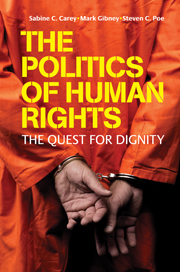Book contents
- Frontmatter
- Contents
- List of text boxes
- List of figures
- List of tables
- List of abbreviations
- Introduction
- Part I Human rights and state responsibilities
- Part II Empirical representations and explanations of human rights violations
- 4 Where are human rights violated?
- 5 Why are human rights violated? An examination of personal integrity rights
- Part III Intervening and rebuilding in the wake of repression
- Bibliography
- Index
- References
5 - Why are human rights violated? An examination of personal integrity rights
Published online by Cambridge University Press: 05 June 2012
- Frontmatter
- Contents
- List of text boxes
- List of figures
- List of tables
- List of abbreviations
- Introduction
- Part I Human rights and state responsibilities
- Part II Empirical representations and explanations of human rights violations
- 4 Where are human rights violated?
- 5 Why are human rights violated? An examination of personal integrity rights
- Part III Intervening and rebuilding in the wake of repression
- Bibliography
- Index
- References
Summary
In the previous chapter we showed where certain rights are commonly violated. But what motivates governments to torture and to kill others? Why do peaceful forms of communication and negotiation collapse in favour of violence and destruction? Are acts of atrocity born out of rational calculations or are they the product of erratic and unpredictable behaviour? In this chapter we present a theoretical framework that helps us to understand the circumstances that give rise to such actions. We do not argue that we can accurately predict and explain every act of violence and repression. But we show empirically that this framework can help us to identify situations and characteristics of countries that make them more prone to experiencing the violation of personal integrity rights.
The state as perpetrator of human rights violations
The primary goal of governments is to protect the lives and well-being of their citizens. To fulfil this role, political leaders control the institutions that are designed to enforce law and order and to defend their people against foreign aggression. But this control over power can be misused and those institutions can be turned against their own citizens. A range of actors besides governments have violated the right to personal integrity in the past, such as guerrilla groups, rebels and terrorists. But governments are particularly powerful actors, as they have a range of tools at their disposal that they can use to imprison, torture and kill their citizens unlawfully.
- Type
- Chapter
- Information
- The Politics of Human RightsThe Quest for Dignity, pp. 126 - 161Publisher: Cambridge University PressPrint publication year: 2010

